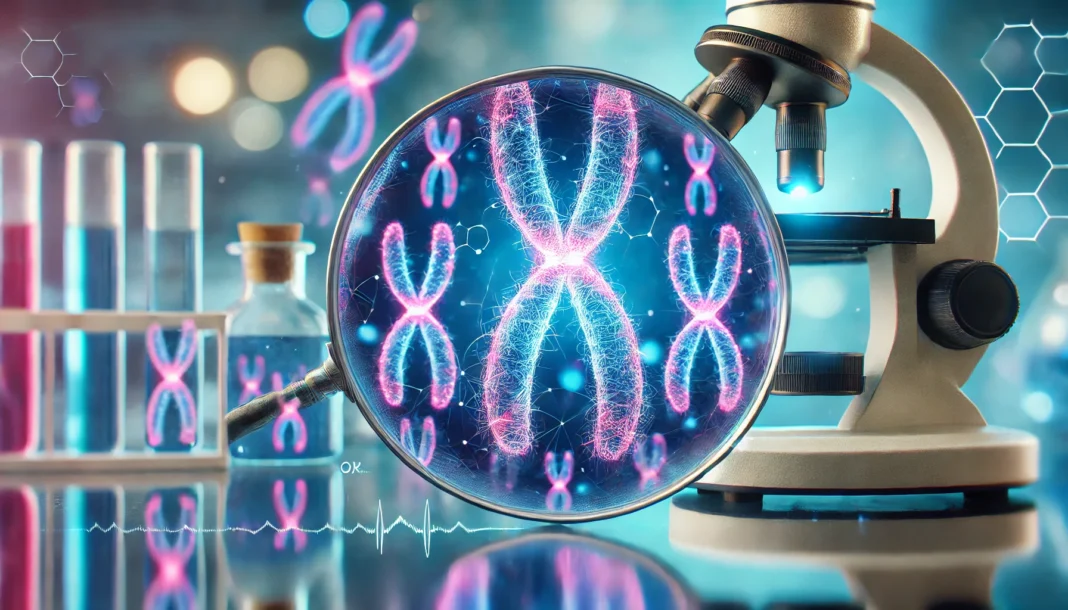Introduction
In the realm of modern medicine, chromosomal testing has become an essential tool for understanding genetic makeup and assessing potential health risks. The ability to analyze DNA at the chromosomal level provides profound insights into inherited conditions, congenital disorders, and predispositions to various diseases. Chromosomal testing is particularly crucial for individuals seeking clarity on genetic health concerns, those planning for pregnancy, or adults facing unexplained medical conditions. As the field of genetics advances, so too does our ability to decode chromosomal structures, offering a clearer picture of how genetic information influences overall well-being.
You may also like: Precision vs. Personalized Medicine: Understanding the Key Differences and Their Impact on Future Healthcare
Understanding the chromosome test meaning and how these tests function can help individuals make informed decisions about their health. Whether performed for diagnostic purposes, reproductive planning, or personalized medicine, chromosomal testing can uncover crucial genetic information. The significance of DNA analysis chromosomal evaluations cannot be overstated, as they provide the foundation for identifying chromosomal abnormalities and informing medical decisions. In this comprehensive guide, we will explore the various types of chromosomal tests, their implications, the conditions they detect, and the future of genetic research in healthcare.

The Basics of Chromosomal Testing
Chromosomal testing, often referred to as karyotyping or cytogenetic analysis, involves the examination of an individual’s chromosomes to detect abnormalities in their number or structure. Chromosomes are thread-like structures composed of DNA and proteins, containing the genetic instructions necessary for the body’s development and function. Humans typically have 46 chromosomes arranged in 23 pairs. Any deviation from this standard can lead to genetic disorders or other health conditions.
To define genetic testing accurately, it is important to differentiate it from general DNA testing. Genetic testing encompasses a broad range of examinations that identify mutations, variations, and structural changes in DNA. Chromosomal testing, a subset of genetic testing, focuses specifically on the analysis of entire chromosomes or large chromosomal segments. Through chromosomal testing, clinicians can diagnose syndromes such as Down syndrome, Turner syndrome, and Klinefelter syndrome, among others.
A chromosome test for adults may be recommended in cases of infertility, recurrent pregnancy loss, developmental delays, or unexplained medical symptoms. This test can provide insights into potential hereditary conditions and aid in the development of targeted treatment plans. The question of “Can you test chromosomes?” is answered with a resounding yes, as medical technology has made it possible to conduct various types of chromosomal assessments using blood samples, amniotic fluid, or tissue biopsies.
Types of Chromosomal Testing
Several methods exist for conducting chromosomal tests, each serving different diagnostic purposes. These methods vary in their technological approaches and the conditions they can detect. Below are some of the most widely used chromosomal testing techniques:
Karyotyping
Karyotyping is the most traditional form of chromosomal testing and involves the visualization of chromosomes under a microscope. In this process, a sample of blood, bone marrow, or amniotic fluid is cultured to encourage cell division. The chromosomes are then stained and examined for structural abnormalities. Karyotyping is highly effective in detecting conditions such as Down syndrome (Trisomy 21), Turner syndrome (Monosomy X), and other aneuploidies.
Fluorescence In Situ Hybridization (FISH)
FISH is a more advanced chromosomal testing method that uses fluorescent probes to bind to specific DNA sequences on chromosomes. This technique allows for the detection of microdeletions and duplications that may not be visible through traditional karyotyping. FISH is often employed in cancer diagnostics, prenatal testing, and the identification of rare genetic disorders. The enhanced sensitivity of DNA analysis chromosomal testing via FISH makes it a valuable tool for uncovering minute genetic alterations.
Chromosomal Microarray Analysis (CMA)
Chromosomal microarray analysis is a high-resolution genetic test that can detect copy number variations (CNVs) across the genome. Unlike karyotyping, which primarily identifies large-scale chromosomal changes, CMA can pinpoint smaller deletions and duplications that contribute to developmental disorders and intellectual disabilities. CMA is particularly useful in assessing autism spectrum disorders, congenital anomalies, and neurodevelopmental conditions.
Next-Generation Sequencing (NGS) and Whole-Genome Sequencing
Next-generation sequencing (NGS) has revolutionized chromosomal testing by enabling comprehensive analysis of the entire genome. This technique sequences millions of DNA fragments simultaneously, offering unparalleled accuracy in identifying genetic mutations and chromosomal abnormalities. Whole-genome sequencing provides an extensive overview of genetic variations, making it an essential tool for personalized medicine and advanced genetic research.

Applications of Chromosomal Testing
Chromosomal testing plays a crucial role in multiple medical fields, from prenatal screening to oncology and personalized healthcare. Below are some of the most significant applications of chromosomal testing:
Prenatal and Reproductive Health
Expecting parents often undergo chromosome test for adults to assess potential genetic risks for their unborn child. Non-invasive prenatal testing (NIPT) is commonly used to detect chromosomal conditions such as trisomies (e.g., Down syndrome, Edwards syndrome). Couples struggling with infertility or recurrent miscarriages may also benefit from chromosomal testing to identify potential genetic causes affecting fertility.
Cancer Diagnosis and Treatment
Genetic mutations play a significant role in cancer development, and DNA analysis chromosomal testing can help identify chromosomal translocations and deletions associated with various cancers. By analyzing chromosomal changes in cancer cells, oncologists can tailor treatment strategies to target specific genetic abnormalities. Tests such as FISH and CMA are frequently used in leukemia and lymphoma diagnosis.
Neurological and Developmental Disorders
Chromosomal abnormalities are often implicated in conditions such as autism, intellectual disabilities, and neurodevelopmental disorders. Chromosomal testing helps in diagnosing syndromes such as Fragile X syndrome, Williams syndrome, and Prader-Willi syndrome. Early detection allows for better intervention strategies and personalized therapy plans.

Frequently Asked Questions (FAQ) on Chromosomal Testing and DNA Analysis
1. What is the chromosome test meaning in genetic diagnostics?
The chromosome test meaning in genetic diagnostics refers to a laboratory procedure used to examine an individual’s chromosomes for abnormalities. This type of chromosomal testing helps identify genetic disorders, structural chromosomal changes, and inherited conditions that may not be detectable through standard DNA analysis chromosomal techniques. By analyzing the entire set of chromosomes, medical professionals can pinpoint missing, extra, or rearranged genetic material. Understanding the chromosome test meaning allows patients and healthcare providers to make informed decisions about potential health risks and family planning. It is especially useful for detecting conditions such as Down syndrome, Turner syndrome, and other chromosomal abnormalities that may impact overall health.
2. How does DNA analysis chromosomal testing differ from standard genetic tests?
DNA analysis chromosomal testing focuses on examining entire chromosomes for large-scale genetic alterations, whereas standard genetic tests often analyze specific genes or smaller DNA segments. This type of chromosomal testing is crucial when a genetic disorder is suspected but not identifiable through traditional DNA sequencing. Unlike targeted genetic tests, which look for known mutations within a single gene, chromosomal testing provides a broader overview of genetic health. The results can help diagnose developmental delays, unexplained infertility, or recurrent pregnancy loss. DNA analysis chromosomal methods include karyotyping, fluorescence in situ hybridization (FISH), and chromosomal microarray analysis (CMA).
3. Can you test chromosomes to determine hereditary health risks?
Yes, chromosomal testing can identify hereditary health risks by detecting structural abnormalities or extra or missing chromosomes that may contribute to genetic diseases. Can you test chromosomes for conditions like inherited cancers, neurological disorders, or metabolic syndromes? While chromosomal testing primarily detects large-scale anomalies, it is often used alongside other genetic tests to provide a complete assessment of hereditary risks. This is particularly relevant for individuals with a family history of chromosomal disorders or unexplained medical conditions. Understanding how chromosomal variations influence health can lead to early interventions and personalized treatment plans.
4. What is the role of chromosome test for adults in genetic medicine?
The chromosome test for adults plays a significant role in diagnosing genetic conditions that may have gone undetected in childhood. Adults experiencing unexplained medical issues, recurrent miscarriages, or fertility problems may undergo chromosomal testing to uncover underlying genetic factors. Unlike routine blood tests, a chromosome test for adults provides insights into inherited disorders, cancer susceptibility, and chromosomal rearrangements that could impact health. This test is also beneficial for individuals seeking answers about congenital conditions that were never formally diagnosed. By detecting chromosomal abnormalities, medical professionals can guide patients toward appropriate medical management and lifestyle adjustments.
5. How does chromosomal testing help in fertility treatments?
Chromosomal testing is a crucial component of fertility treatments as it helps identify genetic causes of infertility and pregnancy loss. Couples struggling with repeated miscarriages or unsuccessful IVF treatments often undergo chromosome test for adults to detect balanced translocations or other chromosomal abnormalities. Chromosomal testing can also be performed on embryos before implantation (preimplantation genetic testing) to increase the chances of a successful pregnancy. Additionally, chromosomal testing aids in determining whether a parent carries a genetic rearrangement that could be passed on to their children. By identifying these genetic factors, doctors can tailor fertility treatments for better outcomes.
6. Can chromosomal testing predict the likelihood of developing genetic diseases?
Yes, chromosomal testing can predict the likelihood of developing certain genetic diseases, especially those linked to chromosomal abnormalities. DNA analysis chromosomal studies can reveal changes in chromosome structure or number that may increase the risk of conditions such as genetic syndromes, cancers, or neurodevelopmental disorders. However, chromosomal testing does not always determine disease severity or exact symptoms. It is often used alongside genetic counseling to help individuals understand their risks and potential preventive measures. The ability to assess chromosomal abnormalities early can lead to proactive healthcare decisions and targeted medical interventions.
7. What are the latest advancements in DNA analysis chromosomal techniques?
Advancements in DNA analysis chromosomal techniques have significantly improved the accuracy and efficiency of genetic testing. Next-generation sequencing (NGS) and chromosomal microarray analysis (CMA) are now widely used to detect minute chromosomal changes that traditional karyotyping might miss. Additionally, whole-genome sequencing (WGS) is becoming more accessible, allowing for comprehensive analysis of genetic material, including structural variations. These advanced methods provide deeper insights into rare genetic disorders and enable precision medicine approaches. As research continues, new technologies in chromosomal testing may further enhance our understanding of genetic diseases and individualized treatment strategies.
8. Are there risks associated with chromosomal testing?
Chromosomal testing is generally safe, especially when performed using blood or saliva samples. However, certain procedures, such as amniocentesis or chorionic villus sampling (CVS) for prenatal chromosomal testing, carry minimal risks like miscarriage. In some cases, results from DNA analysis chromosomal studies may lead to emotional distress, particularly if unexpected abnormalities are discovered. Genetic counseling is recommended to help individuals interpret test results and make informed decisions. Despite these concerns, chromosomal testing remains a valuable tool for diagnosing genetic conditions and guiding medical care.
9. How can chromosomal testing impact medical treatments?
Chromosomal testing can significantly impact medical treatments by providing a clearer picture of genetic health. For example, chromosome test for adults can guide personalized treatment plans for inherited disorders, cancer therapies, or fertility issues. Knowing whether an individual has chromosomal abnormalities can influence medication choices, lifestyle recommendations, and preventive healthcare strategies. In oncology, chromosomal testing helps determine the most effective targeted therapies for certain cancers. As precision medicine continues to evolve, chromosomal testing will play an increasingly important role in developing individualized healthcare approaches.
10. Can chromosomal testing reveal ancestry and family history?
While chromosomal testing is primarily used for medical diagnostics, it can also provide insights into ancestry and genetic heritage. Some DNA analysis chromosomal techniques can identify inherited traits, ethnic origins, and genetic links to distant relatives. However, ancestry testing differs from clinical chromosomal testing, as it focuses more on lineage rather than disease risk. Companies offering direct-to-consumer genetic testing often use chromosomal data to map out family connections and migration patterns. Understanding your chromosomal makeup can offer both medical benefits and a deeper appreciation of genetic ancestry.
Conclusion
As genetic science continues to evolve, chromosomal testing remains an indispensable tool in medical diagnostics. From identifying hereditary conditions to guiding precision medicine, chromosomal testing provides valuable insights into an individual’s genetic health. Understanding the chromosome test meaning and the various testing methodologies enables individuals to make informed decisions regarding their health and future.
For adults facing unexplained health challenges, infertility, or hereditary risks, a chromosome test for adults can offer clarity and potential treatment pathways. The ability to define genetic testing accurately and appreciate its applications underscores the importance of genetic research in modern healthcare. The question of “Can you test chromosomes?” is not only answered affirmatively but is continually being refined with advancing technologies.
By leveraging DNA analysis chromosomal testing, individuals and medical professionals alike can uncover crucial genetic insights, paving the way for more precise diagnostics, targeted treatments, and improved health outcomes.
genetic screening tests, hereditary disease testing, genome analysis, chromosomal abnormalities detection, prenatal genetic screening, inherited disorder assessment, DNA mutation analysis, karyotype examination, reproductive health genetics, personalized medicine testing, rare genetic conditions, chromosomal deletion analysis, medical genetics advancements, genomic health insights, precision medicine genetics, hereditary cancer screening, chromosomal translocation testing, developmental disorder diagnosis, fertility genetic testing, next-generation genetic sequencing
Further Reading:
Chromosome Analysis (Karyotyping)
Counseling About Genetic Testing and Communication of Genetic Test Results
Genetic testing: a guide for parents
Disclaimer
The information contained in this article is provided for general informational purposes only and is not intended to serve as medical, legal, or professional advice. While MedNewsPedia strives to present accurate, up-to-date, and reliable content, no warranty or guarantee, expressed or implied, is made regarding the completeness, accuracy, or adequacy of the information provided. Readers are strongly advised to seek the guidance of a qualified healthcare provider or other relevant professionals before acting on any information contained in this article. MedNewsPedia, its authors, editors, and contributors expressly disclaim any liability for any damages, losses, or consequences arising directly or indirectly from the use, interpretation, or reliance on any information presented herein. The views and opinions expressed in this article are those of the author(s) and do not necessarily reflect the official policies or positions of MedNewsPedia.


